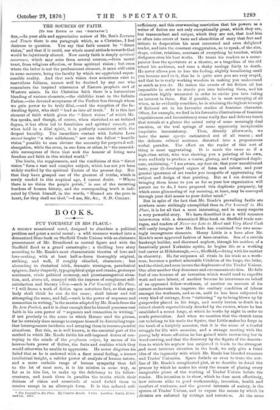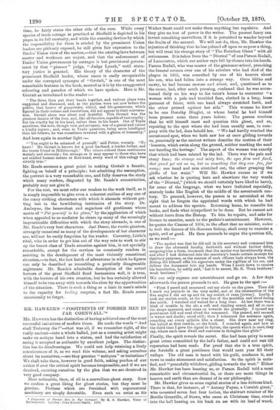BOOKS.
PUT YOURSELF IN HIS PLACE.*
A HIGHLY sensational novel, designed to elucidate a political problem and point a social moral ; a wild romance worked into a dramatized Blue-book on Sheffield Trade Unions with an elaborate presentment of Mr. Broadhead as central figure and with the Sheffield flood as a grand catastrophe ; a thrilling love story according to Mr. Reade's most characteristic theories of love and love-making, with at least half-a-dozen thoroughly original, striking, and well, if roughly chiselled, characters ; but abounding in rhetorical trick, dramatic stratagem, paradoxical epigram, flashy rhapsody, typographical quips and cranks, grotesque sentiment, crude political economy, and phantasmagorical situa- tion, and, above all, stamped with the impress of complacent self- satisfaction and literary Iii3ptc.—such is Put Yourself in His Place. " I will frame a work of fiction upon notorious fact, so that any- body shall think he can do the same ; shall labour and toil attempting the same, and fail,—such is the power of sequence and connection in writing," is the maxim adopted by Mr. Reade from the De Arte Poetics, and it is clear enough that he himself possesses vast faith in his own power of " sequence and connection in writing," if not precisely in the sense in which Horace used the phrase, for he certainly does manage to surpass himself in dovetailing toge- ther heterogeneous incidents and arraying them in inconsequential situations. But this, as is well known, is the essential part of the method in which Mr. Reade fulfils his self-imposed duties of con- veying to the minds of the pro fanum vulvas, by means of his heaven-born power of fiction, the facts and realities which they would otherwise be unable to appreciate. He never disguises his belief that as he is endowed with a finer moral feeling, a keener intellectual insight, a subtler power of analysis of human nature, and a more catholic range of human sympathy than fall to the lot of most men, it is his mission in some way, as far as in him lies, to make up the deficiency to his fellow- creatures, and teach them in parables the truths which their dulness of vision and crassitude of mind forbid them to receive except in an allotropic form. It is this inflated self- • Put Yourself in His Place. By Charles Reads. 3 robs. London: Smith, Elder, and Co. 1870.
sufficiency, and this overweening conviction that his powers as a writer of fiction are not only exceptionally great, which they are, but transcendent and unique, which they are not, that lead him so often into errors of taste and absurdities of story that fret and irritate to desperation his most interested and even delighted reader, and into the constant exaggeration, so to speak, of the size, shape, colour, relations, contrasts of everything he touches, which disfigures even his best works. He treats his readers as a scene- painter does the spectators at a theatre, or a tragedian of the old school his audience, and runs a shaky analogy fairly to death. He never allows you to lose the feeling, slightly humiliating until you become used to it, that he is quite sure you are very stupid, and that he is really working wonders in making you understand as much as you do. He makes the events of his fiction all but impossible in order to startle you into believing them, and his characters highly unnatural in order to excite you into taking an interest in them. But if possible, ho is most annoying of all when, as he evidently considers, he is attaining the highest triumph of fictional art in his favourite studies of feminine character. Often, for example, we find in his favourite illustrations of feminine impulsiveness and inconsistency some really fine and delicate touch that reveals at a glance the actual unity of some seemingly dual emotion, or the real springs of some apparently inexplicable i mpulsive inconsistency. Then, directly afterwards, we have the same apergu caricatured out of all reason ; and the delicate critical sentence distorted into a preposterous verbal paradox. The effect on the reader of this sort of thing is most aggravating. It is much the same as if a high-class artist, who was showing you a painting of his own, were suddenly to produce a coarse, glaring, and vulgarized dupli- cate, exclaiming, " I am aware, my dear sir, that your uncultivated taste, your ill-developed organs of form and colour, and your general ignorance of art render you incapable of appreciating the subject and design of that painting. But as I am desirous of bringing them home to you as far as your low organization will permit me to do, I have prepared this duplicate purposely, by which some glimmering of my meaning, at least, may be conveyed through your dull senses to your duller mind."
But in spite of the fact that Mr. Reade's prevailing faults are nowhere more strikingly exemplified than in Put Yourself in His Place, it is for all that a most interesting, and in many respects a very powerful story. We have described it as a wild romance interwoven with a dramatized Blue-book on Sheffield trade out- rages, and readers of Never too Late to Mend and Very Hard Cash will easily imagine how Mr. Reade has combined the two seem- ingly incongruous elements. Henry Little is a hero after Mr. Reade's most approved fashion of hero-creation. Son of a suicide bankrupt builder, and disowned nephew, through his mother, of a fanatically proud Yorkshire squire, he begins life as a working tool carver at Hillsborough,—i.e, Sheffield,—living with his mother in obscurity. He far surpasses all rivals in his trade as a work- man, becomes a perfect admirable Crichton of the forge, the lathe, and the chisel, and soon incurs the displeasure of the Trades' Unions. One after another they denounce and excommunicate him. He falls foul of one because of an invention which would tend to expedite work and save labour, of another because he intervenes on behalf of an oppressed fellow-workman, of another on account of his earnest endeavours to improve the sanitary condition of labour amongst the workmen, and so on, until he has been subjected to every kind of outrage, from " rattening " up to being blown up by gunpowder placed in his forge, and nearly beaten to death in a ruined church superstitiously dreaded by the rustics, where he has established a secret forge, at which he works by night in order to evade persecution. And when we mention that the church turns out to belong to his uncle the Squire, that Little makes his forge in the tomb of a knightly ancestor, that it is the scene of a fearful struggle for life with assassins, and a strange meeting with the young lady whose affection he has gained while instructing her in wood-carving, and that the discovery by the Squire of the desecra- tion to which his nephew has subjected it leads to the strangest and most intricate situation in the book, we only give a faint idea of the ingenuity with which Mr. Reade has blended romance and Trades' Unionism. Space forbids us even to trace the out- line of Mr. Reade's complicated plot, or to describe in detail the process by which he makes his story the means of placing every imaginable phase of the working of Trades' Unions before the reader. His intention is to show, which he does most effectively, how ruinous alike to good workmanship, invention, health and comfort of workmen, and the general interests of society, is the system of Trades' Unions, and to expose the means by which its dictates are enforced by outrage and terrorism. At the same time, he fairly states the other side of the case. While every species of trade outrage as practised at Sheffield is depicted in his pages in its full enormity, and while the cunning devices by which the responsibility for them is evaded by the prominent Union leaders are pitilessly exposed, he still gives fair expression to the Trades' Union view of the matter,—that the existing laws between master and workmen are unjust, and that the enforcement of Trades' Union government by outrages is but provisional govern- ment by that " pioneer " judge, "Judge Lynch," until statu- tory justice is granted. His theory of the character of the prominent Sheffield leader, whose name is easily recognizable under the corrupted synonym of " Grotait," is one of the most remarkable features in the book, marred as it is by the exaggerated colouring and paradox of which we have spoken. Here is Mr.
Grotait as introduced to the reader :—
" The three then put their heads together, and various plans were suggested and discussed, and, as the parties were not now before the public, that horror of gunpowder, vitriol, and life-preservers, which figured in their notices and resolutions, did not appear in their conversa- tion. Grotait alone was silent and doubtfuL This Grotait was the greatest fanatic of the four, and, like all fanatics, capable of vast cruelty : but his cruelty lay in his head, rather than in his heart. Out of Trade questions, the man, though vain and arrogant, was of a genial and rather a kindly nature ; and, even in Trade questions, being more intelligent than his fellows, he was sometimes invested with a gleam of humanity."
And here again in another light :- " You ought to be ashamed of yourself,' said Potter, warmly. 'No heart ! Mr. Grotait is known for a good husband, a tender father, and the truest friend in Hillsborough.' The others echoed these sentiments warmly and sincerely ; for, strange as it may appear to those who have not studied human nature at first-hand, every word of this eulogy was strictly true."
Mr. Reade assumes a great point in making Grotait a fanatic, fighting on behalf of a principle ; but admitting the assumption, the portrait is a very remarkable one, and fully deserves the study which many readers, disgusted by Mr. Reade's eccentricities, probably may not give it.
For the rest, we must refer our readers to the work itself, as it is simply impossible to give even a coherent outline of any one of the many striking characters with which it abounds without get- ting lost in the bewildering intricacies of the story. Dr. Amboyne, the benevolent and sagacious old gentleman whose motto of "Put yourself in his place," by the application of which when appealed to as mediator he clears up many of the seemingly impracticable difficulties with which the story abounds, is one of Mr. Reade's very best characters. Jael Deuce, the rustic giantess, strangely unnatural as many of the developments of her character are, will not be easily forgotten by the reader. Coventry, Little's rival, who in order to get him out of the way sets to work to stir up the basest class of Trade assassins against him, is not specially remarkable, except for the services he constantly renders in assisting in the development of the most violently sensational situation,—in fact, the last batch of adventures in which he figures can only be described as resembling a peculiarly disagreeable nightmare. Mr. Reade's admirable description of the actual horrors of the great Sheffield flood harmonizes well, it is true, with the horrors of his own creation, but he has certainly allowed himself to be run away with toward& the close by the opportunities of the situation. There is such a thing as a limit in men's minds to the capacity for feeling surprise, a fact Mr. Reade seems occasionally to forget.



































 Previous page
Previous page